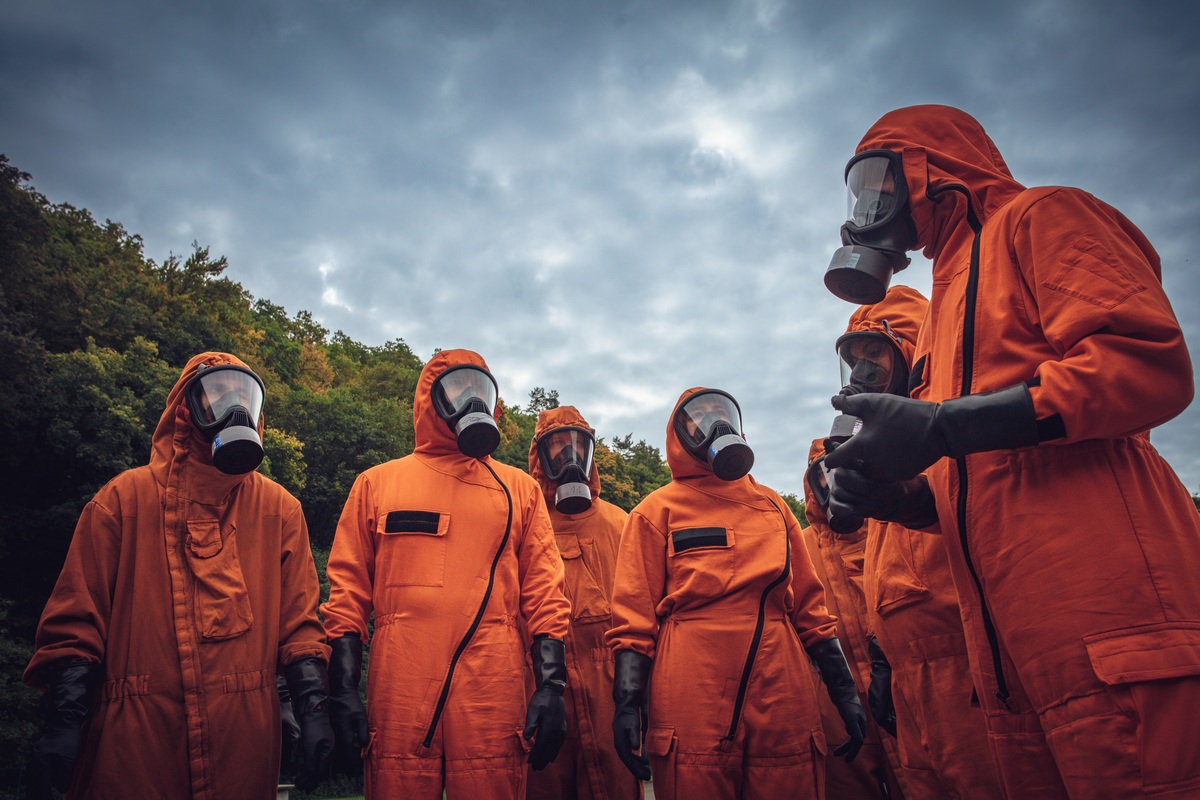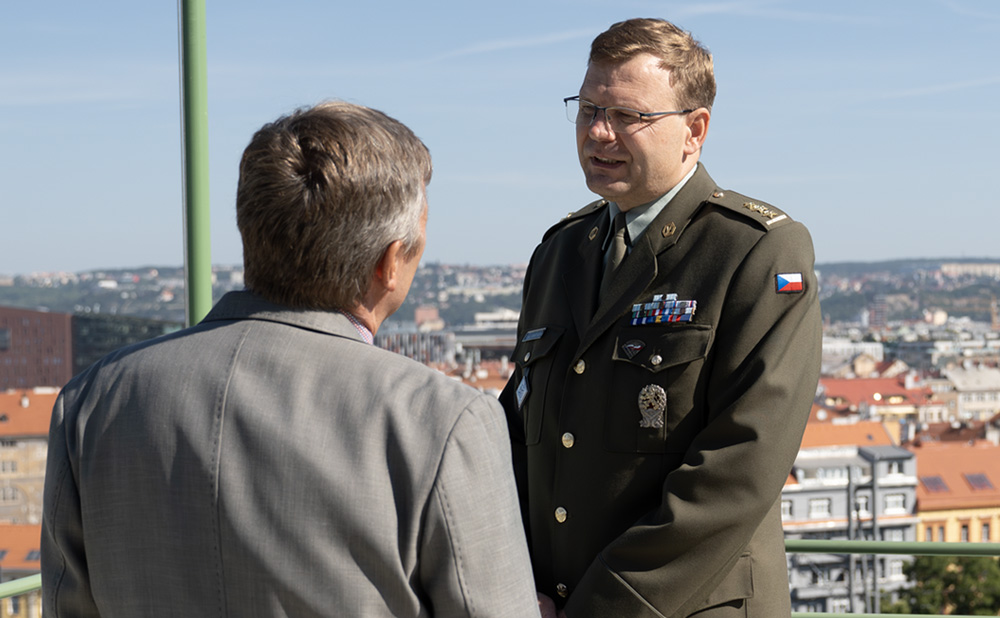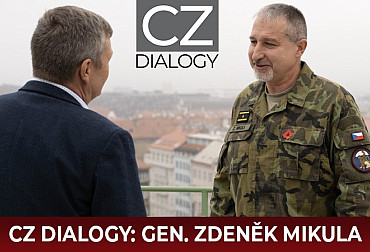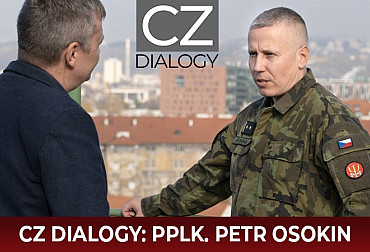Colonel David Martínek: The biggest threat lies in the biological omain
The International Military Organization Joint Chemical, Biological, Radiological and Nuclear Defence Centre of Excellence (JCBRN Defence COE) has been based in Vyškov for 18 years. It is a state-of-the-art facility providing support to the Alliance and other partners in the field of protection against weapons of mass destruction. Its main tasks include supporting transformation, developing doctrines and standards, supporting education and training, gathering information, and, last but not least, developing concepts and conducting experiments. Colonel David Martínek, who has been the director of the Centre since 2019, accepted our invitation to the next episode of our CZ DIALOGUES discussion program.
Video: Interview with JCBRN Defence COE Director Colonel David Martínek / CZ DEFENCE
We learned that the Vyškov site, within NATO, is primarily focused on updating and revising documentation in the field of CBRN, i.e., the protection against weapons of mass destruction. "It’s not just limited to these documents, as we ensure that other relevant documents are linked to CBRN Defence. If we are talking about intelligence gathering, it is important for us to learn from mistakes made during operations or exercises. If something happens that shouldn’t have, it is analyzed. We determine why it occurred, and based on that, we are able to modify military documents, for example," explains Colonel Martínek at the beginning of the interview, which focuses on the role of the JCBRN Defence COE.
The uniqueness of the Centre is confirmed by its association with the Allied Command Transformation in Norfolk, USA. "However, we are not commanded by them; we are commanded by the states that are members of the COE. These are referred to as Sponsoring Nations, and they contribute not only personnel but also funds to the COE," reveals the Centre's director. Currently, the Centre has 13 sponsoring countries, including the Czech Republic, Italy, Canada, France, Germany, Hungary, Poland, Slovakia, Slovenia, Romania, the UK, and the USA. Austria is also a contributing country.
As mentioned earlier, the JCBRN Defence COE is based in Vyškov and operates with the participation of international partners. "I would say that we have built a certain reputation both globally and within NATO over the years," says Colonel Martínek, acknowledging the efforts of those who seized the opportunity to establish the JCBRN Defence COE in the Czech Republic after the 2002 NATO Summit in Prague. Representatives of the Czech Army’s chemical forces saw a chance to create the Centre and decided to take advantage of it.
The Centre’s Czech partners include facilities in Těchonín, the University of Defence, the Institute for Protection Against Weapons of Mass Destruction, and units such as the 314th Weapons of Mass Destruction Alert Centre, which operates in Hostivice-Břvích near Prague and other locations throughout the Czech Republic.
The acronym JCBRN Defence COE encompasses a wide range of activities and tasks that align with NATO priorities. "Individual NATO headquarters, as well as those of our sponsoring nations, can send a 'Request for Support.' They submit a request for a project or task in which they need our participation," Colonel Martínek explains. "Based on these requests, a prioritization is conducted according to NATO’s annual priorities. The idea is that the Centre will be able to meet the highest priority requirements. However, the JCBRN Defence COE not only responds to tasks but also provides 'reachback' support to HQs or units in operations."
"We can describe it as a form of information support. We evaluate situations or respond to questions from units that encounter something new. They might ask what it is or how they should act. As part of our daily activities, we monitor global events through open sources. Based on our expertise, we can assess the situation or even warn our allies of potential developments," Colonel Martínek adds, mentioning examples like the threat to nuclear complexes in Ukraine.
The Centre also supports research to some extent, collaborating on various projects. "We don’t have laboratories where we conduct experiments or research. Instead, we contribute our knowledge. We consider today’s challenges, discussing technology, drones, and climate change, and how it could impact CBRN. I would highlight that the biggest threat is in the biological area. There could be releases of new bacteria and viruses that we are not familiar with," reveals Colonel Martínek.

Naturally, the Vyškov Centre also deals with global threats, including COVID-19. "I must admit that at first, there were many unknowns. Nobody knew the implications. The numbers were unclear. The initial question about COVID-19 was whether it could be used as a weapon and whether it had been weaponized. Those were the basic questions we asked at the time," recalls Colonel Martínek.
The Ukrainian battlefield is a valuable source of information for the JCBRN Defence COE. "We have some cooperation and support with Ukraine, particularly in the area of training. As for battlefield reports, they are limited. Information is shared on a 'need-to-know' basis. Ukraine communicates certain details only to specific partners, and we don’t receive all information directly," Colonel Martínek says, explaining that they work primarily with open sources. "This is a limitation because the reports aren’t always relevant, so we must be cautious. However, they provide a picture of what is happening in the area," the director notes.
At the beginning of the war in Ukraine, there was a significant threat of radiation leaks if nuclear power plants were attacked. "We conducted an assessment, informed our partners about the potential impacts, and modeled the situation to provide a relevant response regarding the level of threat," recalls Colonel Martínek.
We asked whether the possibility of Russia using a nuclear power plant as a weapon was a valid concern. "That’s a good question. I think everyone is asking that. There are, of course, differing opinions. Personally, I think it’s quite risky. In terms of weather patterns, we can predict the spread of radiation to some extent. However, I believe it would be a step too far, completely against international law, and would likely have devastating consequences in the future," says Colonel Martínek.

As with other military capabilities, training is crucial within the JCBRN Defence COE and has its own specifics. "There are different levels of training. You can train individual soldiers, groups of soldiers, or even decision-makers. Various tools are used, such as 'tabletop exercises,' where participants are presented with scenarios and practice decision-making processes. I believe that decision-making is the most critical and challenging part," says Colonel Martínek, head of the Centre.
And how prepared is the Czech Republic for chemical, biological, and nuclear threats? "Our preparedness is, of course, good. I wouldn’t say it’s perfect. It would be naive to think we are ready for everything. However, I would say that we have a solid capability to respond effectively within the limits of what’s possible," concludes Colonel David Martínek, Director of the JCBRN Defence COE. For the full interview with Colonel Martínek, visit our YouTube channel in the CZ DIALOGUES program.





















